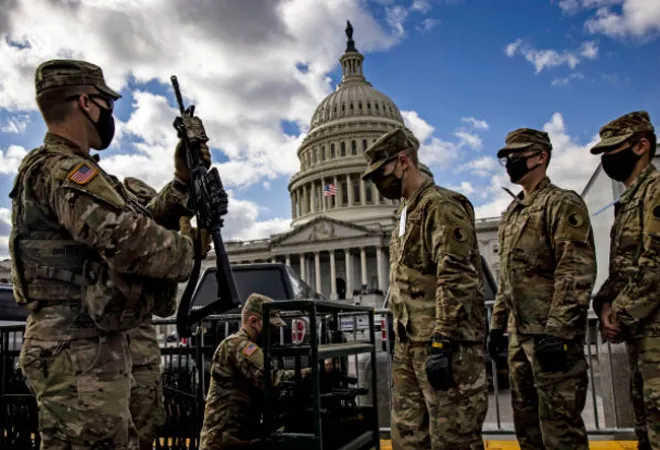
This 6 January marked the first anniversary of the infamous Capitol Riots, when a mob entered the US Capitol building at the exhortation of former President Donald Trump. The group sought to disrupt the joint session of the Congress, assembled to count the Electoral College votes and certify Joe Biden as the newly elected US President. In an almost literal interpretation of the ‘of the people’ dimension of democratic values, several hundred protesters broke into the Capitol building, crashing through the barricades, climbing the walls, and breaking through the windows. Indeed, the largest symbol of American democracy was under siege for a few hours. Amongst other markers, the event will remain remarkably historic in that it changed how American democracy came to be perceived around the world. The violence, vandalism, brazen white nationalism, and loss of lives symbolised one of the biggest backslides in American democracy. Amongst the most outstanding factors that continue to bog the US democracy today is the continued structural vulnerabilities of the American political and social systems, led by political factionalism that engendered the US Capitol Riots in the first place.
The violence, vandalism, brazen white nationalism, and loss of lives symbolised one of the biggest backslides in American democracy.
The American democracy remains fraught in various ways. Leading this acknowledgement of democracy deficit back home was the US president Joe Biden himself, who made a
speech on the anniversary of the Capitol Riots this year to warn Americans that democracy in the US remains at risk even a year after the unfortunate incident. Biden’s primary plank while assessing the health of American democracy was naturally its fragility, even as the US remains politically divided. In a
survey in September last year, one in five Americans agree that the 2021 election was stolen from Donald Trump and President Biden is an illegitimate President; 21 million Americans believe that the use of force is justified to restore Trump to the Presidency. The same survey also found that out of this 21 million with insurrectionist sentiment, 7 million owned a gun, 6 million said they supported right-wing militias, and at least 1 million associated themselves directly or indirectly with right wing-groups such as “Oath Keepers” and “Proud Boys”. Amongst this same group of 21 million Americans, 63 percent believe in the Replacement Theory, a racist conspiracy theory that the white population will eventually be replaced by non-whites; while 54 percent believe in the QAnon movement—an American far-right political conspiracy theory centered on a false claim that a group of Satanic, cannibalistic paedophiles operate a global child sex trafficking ring working against the former US President Donald Trump—and its core principles. The 6 January incident last year reflected the mainstreaming of these divisions and a gradual firming of far-right views and beliefs.
Two investigations into the Capitol Riots, one by the Justice Department and the other by a House Select Committee, are still on.
In many ways, the legacy of last year’s Capitol insurrection lives on. Amongst the three prominent reasons for this are: The lack of an appropriate closure to the incident by way of accountability and justice, the Republican Party’s apparent
delays in the ongoing investigations, and Trump’s continued attempts to fuel political divisions in a prospective attempt to have a chance at rerunning the 2024 presidential race. Two investigations into the Capitol Riots, one by the
Justice Department and the other by a
House Select Committee, are still on. The Federal Bureau of Investigation (FBI) has issued its own
list of most wanted people in the 6 January riots. Besides, the Congress is perhaps at its most divided, with members divided between viewing the anniversary of the riots as a chance to recommit to democracy and a day to be forgotten. The
sharply divided vigils on the first anniversary was only but one reflection of this sentiment. These two political extremities were visible in Biden’s speech on 6 January this year, after which only
two Republicans showed up for the memorial for Capitol police officers who lost their lives in the riots. The lack of an absolute bipartisan consensus on political responsibility, accountability, and acknowledgement of an impending threat that faces the American political system is worrisome. Trump’s continued support
outsizing all other Republican Party members and his persisting attempts to incite his supporters compound the problems for the next US elections and the years leading up to it. Although Trump has not announced his intention to run for President in 2024, he is ‘
thinking about it’. Trump leads his nearest competitor Florida Governor Ron DeStanis by 43 percentage points, leaving enough room for guesses on his potential run for President. As such, there is enough
evidence that Donald Trump is positioned comfortably to subvert the next election. The apparent
militarisation of US politics that began under his presidency has further added to the unpredictability in the US today.
Biden’s 6 January speech reflected a political apprehension that has continued to complicate his administration’s domestic as well as global outlook. The perception of American democracy both at home and outside has taken a severe blow, from which the nation hasn’t recovered even after a year . It was to undo some of this backsliding that President Biden signed a slew of
Executive Orders to give new directions to American policies and distance his administration from that of his predecessor. Despite some of the initial steps, the Biden administration remains mired in some of the geopolitical constraints not necessarily emerging from within the US. The prevailing political and social factionalism in the US has failed to provide the conducive environment to make and build on the structural gains to mitigate perceived deficits inside and outside the country. As foreign policy decisions lead from domestic policies and the two are intricately entwined now more than ever, US foreign policy decisions have been deeply impacted by what has happened inside the country. In fact, the domestic factors weighing heavily on the external ones has become more obvious than in the past, to the extent that the former often impedes the latter . The US decision to pull out its troops from Afghanistan and the growing assertions by China and Russia have constricted the US’ space and limited its options internationally, relative to the past. Indeed, the Biden administration accorded the primary reason for the troop pull-out to strategic competition with its ‘
true strategic competitors—China and Russia’. The decision, however, had substantive repercussions for Biden, with his approval ratings
dropping to an all-time low.
As foreign policy decisions lead from domestic policies and the two are intricately entwined now more than ever, US foreign policy decisions have been deeply impacted by what has happened inside the country.
President Biden’s political situation is further complicated by the internal divisions within the Democratic Party, most glaringly visible between the moderates and the extreme left or the progressives. In recent times, such intra-party ideological
divisions have come to be symbolised by pro-business New York City Democratic mayoral nominee Eric Adams and democratic socialist Congresswoman Alexandria Ocasio-Cortez. Divisions between the progressives and moderates within the Democratic Party are threatening to derail the US $3.5-trillion social spending
programme, which includes childcare, education, and green energy measures, and a US $1-trillion bipartisan infrastructure bill. Although the latter has been
signed into law by Biden, much of the spending faces an
uncertain future due to internal divisions. Furthermore, the political prospects of the Democrats look
bleak in this year’s midterms. Biden’s
low approval ratings fail to inspire any confidence for the current slender majorities for the Democratic Party in the House and the Senate, and his support base amongst independent voters is
dwindling.
As President Biden faces a fractured socio-political milieu inside the US, his strategy has broadly centered on strengthening the outside to gain control of the domestic. Albeit the success of that strategy can itself be debated, Biden’s focus on regaining the global centre stage and primacy for the US seems obvious. As such, his administration’s focus on undoing the ‘damages’ by the Trump-era policies has included repairing US alliances across the world including trans-Atlantic ties, regaining global leadership through uniting democracies, resisting authoritarianism, and building cooperation through agenda-based leadership objectives such as global climate change, counterterrorism, and a favourable balance of power in the Indo-Pacific.
These externalities will, however, depend on how Biden navigates the time until the 2024 presidential elections, but more so on what Donald Trump does. While the ongoing legal investigations against Trump could curb the extent of political mobilisation of his support, the poll numbers are in his favour. Trump recently
cancelled a press conference initially planned at his Mar-a-Lago Club in Florida to mark the first anniversary of the Capitol Riots. He has instead deferred the address to a
rally in Arizona in the following week. Such public meetings could very well become reasons for insurrection in the future. Such contestations by Trump will keep the political atmosphere simmering.
These challenges are likely to continue for the Biden administration. The key question is: Will Biden be able to take America out of the era of ‘
democratic emergency’?
The views expressed above belong to the author(s). ORF research and analyses now available on Telegram! Click here to access our curated content — blogs, longforms and interviews.



 This 6 January marked the first anniversary of the infamous Capitol Riots, when a mob entered the US Capitol building at the exhortation of former President Donald Trump. The group sought to disrupt the joint session of the Congress, assembled to count the Electoral College votes and certify Joe Biden as the newly elected US President. In an almost literal interpretation of the ‘of the people’ dimension of democratic values, several hundred protesters broke into the Capitol building, crashing through the barricades, climbing the walls, and breaking through the windows. Indeed, the largest symbol of American democracy was under siege for a few hours. Amongst other markers, the event will remain remarkably historic in that it changed how American democracy came to be perceived around the world. The violence, vandalism, brazen white nationalism, and loss of lives symbolised one of the biggest backslides in American democracy. Amongst the most outstanding factors that continue to bog the US democracy today is the continued structural vulnerabilities of the American political and social systems, led by political factionalism that engendered the US Capitol Riots in the first place.
This 6 January marked the first anniversary of the infamous Capitol Riots, when a mob entered the US Capitol building at the exhortation of former President Donald Trump. The group sought to disrupt the joint session of the Congress, assembled to count the Electoral College votes and certify Joe Biden as the newly elected US President. In an almost literal interpretation of the ‘of the people’ dimension of democratic values, several hundred protesters broke into the Capitol building, crashing through the barricades, climbing the walls, and breaking through the windows. Indeed, the largest symbol of American democracy was under siege for a few hours. Amongst other markers, the event will remain remarkably historic in that it changed how American democracy came to be perceived around the world. The violence, vandalism, brazen white nationalism, and loss of lives symbolised one of the biggest backslides in American democracy. Amongst the most outstanding factors that continue to bog the US democracy today is the continued structural vulnerabilities of the American political and social systems, led by political factionalism that engendered the US Capitol Riots in the first place.
 PREV
PREV


